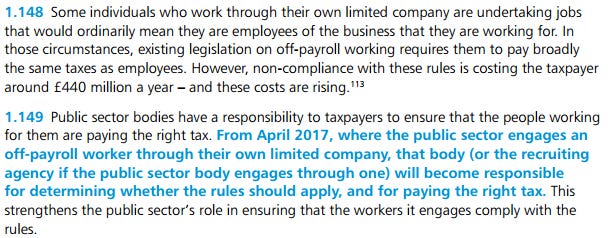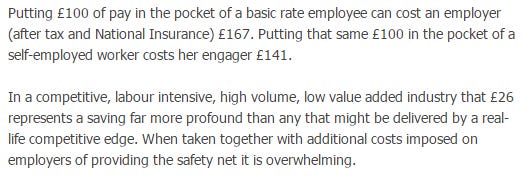Discriminating against the State
One of the odder measures in today's Budget is this (from George Osborne's speech)

In principle, it is welcome.
I explained here that self-employed workers are favourably treated for tax purposes, that a worker's status as self-employment delivers very valuable benefits to her engager, and that personal service companies are abused to denude the Government of much needed tax revenues and workers of valuable employment law rights.
This measure carries a predicted yield of £555m over the life of the Parliament and appears to be exactly the measure I argued for here.
The curiosity is why it is confined to public sector employers?
George Osborne gives us no clue. Nor does the Office for Budget Responsibility's Economic and fiscal outlook. The closest we get is in the Red Book:

But this reasoning is not particular to the public sector. Everyone, surely, has a responsibility to ensure that the people working for them are paying the right tax?
The abuse is far from public-sector specific. Indeed I argued here that the private sector is the environment in which the behaviour has its most destructive impacts - of distorting competition and destroying 'good' businesses. And the types of environment in which it is most likely to be seen are in the private sector:

This Select Committee report, too, suggests that personal service companies are most often used in the private sector. And Government has already tackled public sector abuse through this Procurement Policy Note.
But of course, everything has a reason.
What we do know is that it will put the public sector at a competitive disadvantage compared with the private sector. It will be difficult for public sector organisations to engage workers on a self-employed basis: they will bear the risk of getting wrong the assessment that a worker is self-employed. They will be driven to engage workers on an employed basis to avoid that risk - and this will increase their wage bill by up to 13.8%. The private sector will continue to be able to transfer that risk to the worker - or his personal service company. The private sector will, in effect, be able to buy the same worker for 13.8% less.
Why might this result be desired?
I can think of only one explanation.
Were you wanting to shrink the State; to force more outsourcing; to pass public money to big outsourcing companies... you might tilt the playing field. You might do this.
[twitter-follow screen_name='jolyonmaugham']

